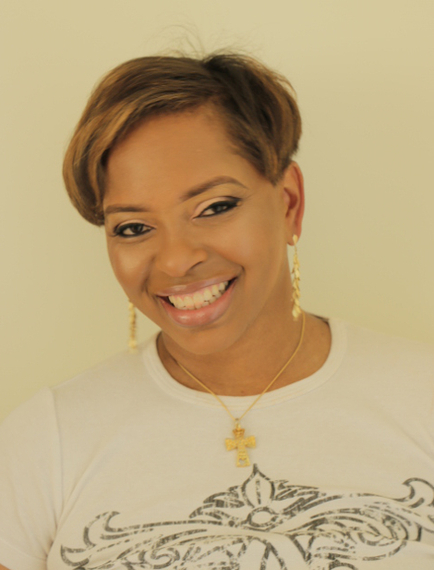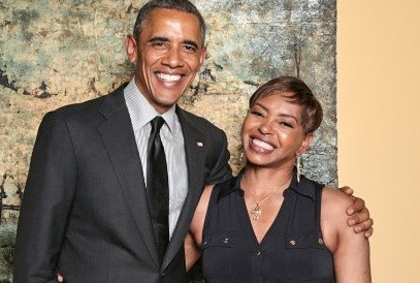Long have I been intrigued by the intersection of the pop and the practical - meaning: how and where do popular culture and, you know, useful stuff, connect, affect each other, and cross-pollinate? Some answers to this - and plenty more involving health, healing, media, and even saving lives - I learned in a recent conversation with Dr. Kiki Hurt.
Specializing in Anesthesiology, Critical Care, and Internal Medicine, Dr. Hurt is a triple board-certified physician; as well as an author, educator, producer, publisher, and founder/CEO of Global Music 4 Life: an ever-expanding multimedia company developing and releasing e-books, music, apps, and television series. Dr. Hurt's book Mini Medical School is available in the Apple Store, with its revised edition (touted as "an alternative to Obamacare"), entitled Save Your Own Life, en route. She's a multihyphenate presence of a dizzying degree (the lady even develops health-conscious video games), so I begin by asking her how she juggles so much, so well. Does she sleep?
"I don't sleep a lot," Dr. Hurt laughs. "I work a lot, and I'm very dedicated to my patients." She continues: "I think if people realize it, all of these things kind of go together. The longer you train in any field, be it journalism, or medicine, or music, it's just going to add to what you already know. So at some point, what looks like separate fields to the outside world, it's really one big theme.
"I've got a really great perspective of what medicine looks like, from various avenues: from the operating room to the cardiac surgery room, to the OB-GYN room, to just being in the clinic or ICU after major trauma - because the body never changes! It's just wherever you put it."
Next, given that entertainment reaches everybody, I want to know how Dr. Hurt blends health, science, and the entertainment industry.
"Oh, that's easy," she enthuses. "Whenever you try to talk to a patient, you try to find a way to meet them where they are - and the one thing we know is universal is music. You and I may not know the same language, but we can hear a song, and from listening to that song, we can both grasp whether it was a happy song, or a sad song, or angry, or whatever. And so, looking at medicine as an art - because it truly is an art; that's why it's called a "practice" - then you try to find a way to bring art to it. I've seen a lot of people die from things that are completely preventable; it was more of a lack of knowledge - which crosses all barriers: it's not based on color, race, religion, or money - it's just that information may have been delivered in a way that was not understood.
"But music is universal," she notes, "so that's where we started, using concepts artists have used for years: that if you can get a concept into someone's head, then they'll keep singing your song. So it was like, 'What if we could do that with health?' I could get you to understand your body, or what to do in emergency situations, and you wouldn't even know that's what I'm doing - because I make it sound like regular music that you'd hear on the radio, or if it's a cartoon, or television show, or game, it looks like regular, everyday stuff."
Blending the body, the science, and the social outreach, I feel like Dr. Hurt is suggesting Prince jamming with They Might Be Giants and Woody Guthrie (somebody bottle that!) - but in fact the good doctor (currently working in the ICU of Long Island Jewish Hospital in Brooklyn; as well as Sunny Down State Long Island Hospital for Medical and Surgical Critical Care) has formed her own musical troupe in Los Angeles: the aforementioned GlobalMusic4Life - creating pop, soul, alternative, hip hop, and medical music.
Medical music! There's a term! I bring up Bobby McFerrin's terrific album, Medicine Music (because, albums, that's how I often relate to the world); and Dr. Hurt seems comfortable with the parallel. "That's how we bring medicine and art together," she notes. Even hardcore rappers signed on with her (albeit swapping out hardcore language for more salubrious content), because a Dr. Hurt production is a real gig.
A singer, songwriter, and producer (she comes from a musical family, and caught on quickly), Dr. Hurt elaborates on the evolution of GlobalMusic4Life:
"I found a group of very talented, very intelligent artists, composers; and we figured that if we could find a composition people like - a track, or a beat - then they would hear the music, and they'll get the message later."
The music went over well with L.A. DJs (only one of whom immediately caught the themes) - and here Dr. Hurt adds a line you simply don't hear every day:
"We have a song for just about every major disease or illness out there."
There you go: leading the pack in hip-hop medical music!
I briefly turn the topic to the American epidemic of childhood obesity - and its attendant issue: kids throwing away school lunches because they're "too healthy" - and Dr. Hurt offers sensible advice: meeting in the middle, finding healthy foods which are also delicious, adding in common sense, "If I were a kid, would I want to eat that?" She laughs. "If your answer is no, then why would you give it to kids?"
Joining our conversation is Lanre Idewu of FIT4LA, production partner to Dr. Hurt.
"Introducing urban gardening to students is a way to get kids interested in vegetables," he elaborates, down with the healthy arts, "in watching the garden growing, in backyards of their own neighborhoods, in the backyard of the school, or even inside the school in the Midwest."
We turn to the TV series in development, and Dr. Hurt reveals her plans: "I use Law & Order as my reference. Most procedurals currently airing - legal, medical and/or crime programs -- show you a murder every week - somebody's gonna die; it's just about how they die. I'm gonna show you a heart attack in 50 different ways, and if you keep seeing certain signals, symptoms and warning signs, over and over, you're going to eventually learn how to detect, react to and hopefully prevent the cardiac arrest of a loved one or coworker.
"But the information has to be shown as entertainment. It can't be a documentary. It can't be preachy - no one likes to be preached to. And people like stories about themselves as well; they like stories that they can relate to. And so, who hasn't gone to the hospital when their mother was sick, and didn't know who to talk to? Or what the ventilator was?"
Dr. Hurt brings it home: "These stories actually happen to somebody, somewhere. They could happen to you, at some point.
"Whenever anyone reads the stories that I've written - the drama series - they get drawn in, because they can relate. Someone asked me, 'I've never seen any of these stories on television - why not?' I was like, 'Maybe they're not using doctors that are really trying to tell the stories of the patients. Maybe they're more focused on the entertainment, the main characters.'"
"Dr. Hurt is incredibly modest," adds Mr. Idewu. "She's created a series (Malice) and several other subjects that are better than 90% of what's currently on television. The amazing thing about it is the plethora of stories that she's already created - that there is content for years and years and years. Because every time she's on shift, there's a brand new story, a brand new incident - things that have appeared in the news, things that haven't, things that you would never think could happen, but they do.
.
"The volume of information," Lanre continues, "I think that's one of the major benefits of having Dr. Hurt - because she's in there, she's living it on a daily basis. She's not a retired or title-only physician whose only position is as the medical consultant on a show; we're actually getting it from the source."
Of the material he enthuses: "It's very, very truthful, realistic, and it just keeps coming. So we have a triple board-certified physician whom doctors call when they get in trouble! The perspective is just incredible. And the breadth of subjects and patients that she sees - it's pretty unbelievable."
Dr. Hurt nails the overriding theme, which perfectly focuses her intentions: "I just want to find a way to help people help themselves."
photos courtesy of Dr. Kiki Hurt
Official Site: Global Media 4 Life
Follow Dr. Kiki Hurt & Co. on Twitter

